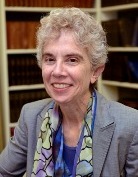Election Law Reform – Debra L. Raskin

President’s Column, November 2015
With another Election Day behind us, we are thoroughly unsurprised at reports of abysmal voter turnout. As we head toward primary season for the 2016 elections, now seems a good time to reflect on why this is and to review an issue of great importance to the New York City Bar Association: election law reform.
The City Bar has long championed support for election law reform at the city, state and federal levels. As we are all too aware, running an effective political campaign is costly; candidates must spend an enormous amount of time on fundraising and those who are not willing or able to attract large donors may be foreclosed from running for office. The existing campaign finance system favors incumbents and gives large donors unparalleled access to candidates who, once they are elected, have the power to regulate those very individuals and organizations that provided the funding to help get them elected to office. The appearance of impropriety created by the enormous sums of money flowing through our electoral process contributes to the public’s growing cynicism and skepticism about the integrity of our political system, and undoubtedly lends to the ennui and diminishing voter turnout that we are seeing both in New York and across the nation.
In the last few years, the City Bar has redoubled its efforts to bring about meaningful ethics, rules and campaign finance reform in New York State. In the wake of a seemingly endless line of corruption and other charges levied against members of the Legislature, the City Bar reaffirmed its position that legislator disclosure laws must be strengthened to ensure transparency and public confidence in the governing process. We also championed the need for a single independent agency to oversee and enforce ethics laws for the Executive, Legislature and lobbyists. After the Joint Commission on Public Ethics (JCOPE) was established in 2011, we analyzed its impact and issued recommendations on how to strengthen JCOPE to make it more effective, both without legislative intervention as well as with necessary legislative amendments to ensure that it operates independently.
We continue to support public campaign financing in New York elections. We believe many of the problems inherent in our current system could be solved through stricter limits on political contributions, enhanced disclosure of campaign contributions and expenditures, more effective enforcement of campaign financing laws, curbs on transfers by legislative party committees, effective regulation of “independent” expenditures on campaigns, and stricter controls over the use of funds raised for campaigns.
At the city level, we have urged the City Council and the Mayor to implement multiple measures to increase voter registration and turnout, including in-person early voting (permitting voters to vote early without having to provide an “excuse” or explanation); no-excuse absentee balloting (permitting voters to vote for city officials by absentee ballot, for any reason); same-day Election Day registration and automatic or online voter registration (currently, New York law requires voters to register at least 25 days before an election); and “instant runoffs” (enabling voters in primary elections for city offices to vote for both their first and second choices, to avoid the administrative difficulties and duplication required by having a second runoff election if no candidate emerges with 40% of the primary vote).
And, at the federal level, we have urged Congress to pass the Voting Rights Amendment Act, which would restore some of the protections of the Voting Rights Act of 1965 that were eviscerated by the Supreme Court’s 2013 decision in Shelby County v. Holder. The Shelby decision struck down as unconstitutional the coverage formula in Section 4 of the Voting Rights Act which designated all or parts of 15 states—including Bronx, Kings and New York Counties—as subject to federal oversight when making changes in election laws. This, in turn, rendered obsolete Section 5 of the VRA which requires those jurisdictions identified under Section 4’s formula to obtain “preclearance” from the Attorney General or a three-judge panel in the District of Columbia to ensure that changes in voting laws do not have a discriminatory effect. However, there is evidence that discrimination against minorities and non-English speakers remains prevalent in many jurisdictions, including in New York State, making continued federal protection of voting rights crucial.
Finally, and remarkably, New Yorkers still face separate primary days for both federal and state officers and party positions. Currently, New York holds its primaries for public office in state and local municipalities and for party positions (other than President and National Convention delegates and alternates) in September, while primaries for public offices at the federal level are held in June. This creates the possibility of as many as three primaries in a given calendar year, as was the case in the 2012 election cycle. Getting voters to the polls once a year is hard enough; getting them to the polls two or three times a year is clearly asking too much, as evidenced by the 2012 voter turnout numbers (10% of eligible NYC voters voted in the June federal primary and September state primary, and only 6% in the April Presidential primary). There is legislation pending in Albany to set the fourth Tuesday in June as a single primary day and the City Bar supports it. Of course, as with any legislative solution to a thorny problem, it is not perfect and some see downsides to moving the September primary to June. However, on balance and after careful consideration, we decided to support the bill as an important step towards improving New York’s electoral process.
The City Bar will continue to work on election law reform in 2016 and beyond. Ultimately, we believe, bringing more integrity to the electoral process will attract more voters to the voting booth and more candidates to the campaign trail.

